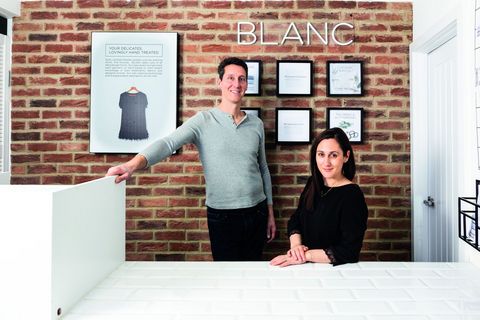Sectors & markets
Rethinking aftercare

Prolonging the life of our wardrobes can have an immediate impact on the environmental cost of the fashion industry. Mathilde Blanc, Co-founder of eco-dry cleaners BLANC, speaks with Marie Koziol of INFO magazine
The longer we wear our clothes the better. So says Mathilde Blanc, of the natural dry-cleaner BLANC, who cites recent figures showing that in the UK we throw away 300,000 tonnes of clothes every single year – preferring fast fashion and frequent purchases rather than making use of the clothes we already own.
‘Prolonging the lifespan of a piece of clothing with nine months will reduce its carbon and water footprint by 20%-30% each,’ says Blanc, whose business is part of a revolution in aftercare which promotes sustainable values.
According to Blanc, not only do we need to wear our clothes for longer, but we also need to care for them in more eco-friendly ways. Thirty-six per cent of the environmental impact of clothes happens at the consumer-use stage – meaning the way we wash and dry at home, as well as our use of traditional dry-cleaning services which mostly use toxic and harmful chemicals when cleaning clothing.
Eco-mindset
‘Within the aftercare industry, things are starting to change and we’re pushing hard to go further. The dry-cleaning industry must evolve,’ says Blanc. Her brand of cleaning only uses water and biodegradable detergents to clean clothes. This is instead of the traditional ‘dry’ clean, which, she says, “is neither dry nor clean” because it uses a toxic liquid called PERC (perchloroethylene, derived from petroleum) that stays in the garments’ fibres long after they have supposedly been cleaned.
At BLANC, sustainability also includes smaller everyday actions, such as choosing energy efficient washing machines, or promoting their values not only to their customers but also to their staff throughout the supply chain. ‘We are also working on our processes so most of the packaging we use is reusable or recyclable (or both!). We are not there yet, but we are moving as far away from plastic as possible, which is tough in our industry because alternatives often do not exist yet as they do in other industries like food or beauty’ she adds.
Blanc notes that customer mindsets are evolving, and whilst quality and results will always be people’s primary consideration, customers are more and more interested to hear about BLANC’s sustainable and ethical ethos, willing to make the switch and ready to spread the word.
‘People care about toxicity in their environment, and they do want their clothes to last longer, especially when they have invested in quality pieces’. The change in the consumption behaviours, via a rise of the second-hand, vintage and rental markets, is led by customers, especially among the younger generations.
BLANC’s message is hitting a chord with this new generation of customers that is keen to not take anything for granted anymore and to ‘check the label’. ‘We’re really focused on giving people solutions to live more sustainably and there is a lot to talk about and a lot to do’ says Blanc. The brand also organises brand collaborations, talks and workshops that help promote BLANC’s focus on quality and sustainability.
Disposal
Blanc firmly believes that people should be helped to make their wardrobes last longer. But when it comes time to part with a garment, there is now a raft of sustainable options for customers to choose from. They can resell clothes on a number of established and newly-launched second-hand platforms or opt for a more traditional route and donate to charities.
‘Frankly, once you’ve looked at what incineration does to the environment and what landfills look like, you’ll try not to put any textiles in the bin at all,’ says Blanc. ‘To be honest with you, I can’t remember doing it for years.’
The slow, but global recognition that the fashion industry is generating an environmental problem of epic proportions has created opportunities for businesses with a focus on sustainability. ‘We’re helping customers to take care of their wardrobes and make their clothes last longer,’ says Blanc. ‘That’s sustainable in itself because one of the biggest problems that the fashion industry needs to face is that it produces too many clothes. Our mission is to shift the focus on quality over quantity.’